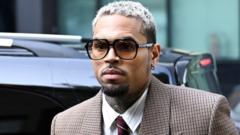A recent court ruling has placed Jair Bolsonaro, the former president of Brazil, under stringent measures as he faces serious allegations of attempting to stage a coup against President Luiz Inacio Lula da Silva. Bolsonaro, who governed Brazil from 2019 until 2022, is now required to wear an ankle monitoring device and adhere to a nightly curfew as a precaution against potential flight during the ongoing legal proceedings.
Court Imposes Ankle Monitor and Curfew on Bolsonaro Amid Coup Charges

Court Imposes Ankle Monitor and Curfew on Bolsonaro Amid Coup Charges
Brazil's former president faces severe restrictions while on trial for alleged coup plotting against current leadership.
The measures stem from fears that Bolsonaro, who has acknowledged challenges to his legitimacy after narrowly losing the 2022 election, may flee the country amid accusations over his involvement in events leading up to the storming of government buildings by his supporters. The Supreme Court’s decision has drawn significant attention, especially following US President Donald Trump's threats, which Bolsonaro claims are politically motivated, aimed at pressuring Brazilian authorities.
In an impassioned response, Bolsonaro branded the restrictions as "supreme humiliation," asserting his commitment to remain in Brazil. The court further mandated a prohibition on social media use and direct communication with certain individuals, including his son Eduardo, who has been active in lobbying for Bolsonaro abroad. This ruling highlights concerns over an alleged campaign to undermine the judicial process and exert influence from abroad, as Bolsonaro reportedly attempted to obstruct justice.
Bolsonaro remains embroiled in a complex legal battle, with eight defendants accused of multiple charges related to the January 2023 insurrection events. Should he be convicted, he faces a lengthy prison sentence, prompting him to assert that he is a victim of a politically charged witch hunt meant to thwart his potential run in the 2026 elections. As the trial progresses, the political landscape in Brazil continues to reveal deep divides, compounded by international ramifications tied to US-Brazil relations.
The federal inquiry into the January insurrection has suggested a "criminal organization" acted in coordination to disrupt the transition of power, with Bolsonaro at the center of the investigation. This evolving situation emphasizes the ongoing tension within Brazil’s political sphere and the challenges the nation faces as it navigates its democratic processes.
In an impassioned response, Bolsonaro branded the restrictions as "supreme humiliation," asserting his commitment to remain in Brazil. The court further mandated a prohibition on social media use and direct communication with certain individuals, including his son Eduardo, who has been active in lobbying for Bolsonaro abroad. This ruling highlights concerns over an alleged campaign to undermine the judicial process and exert influence from abroad, as Bolsonaro reportedly attempted to obstruct justice.
Bolsonaro remains embroiled in a complex legal battle, with eight defendants accused of multiple charges related to the January 2023 insurrection events. Should he be convicted, he faces a lengthy prison sentence, prompting him to assert that he is a victim of a politically charged witch hunt meant to thwart his potential run in the 2026 elections. As the trial progresses, the political landscape in Brazil continues to reveal deep divides, compounded by international ramifications tied to US-Brazil relations.
The federal inquiry into the January insurrection has suggested a "criminal organization" acted in coordination to disrupt the transition of power, with Bolsonaro at the center of the investigation. This evolving situation emphasizes the ongoing tension within Brazil’s political sphere and the challenges the nation faces as it navigates its democratic processes.




















